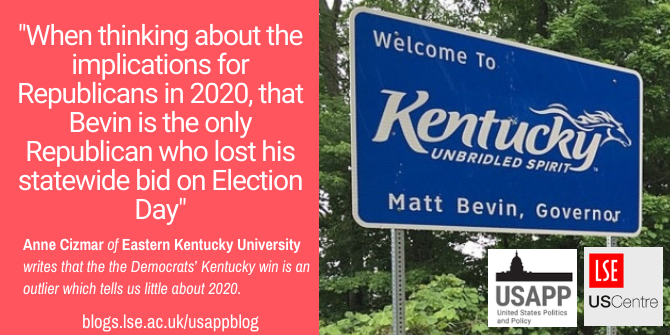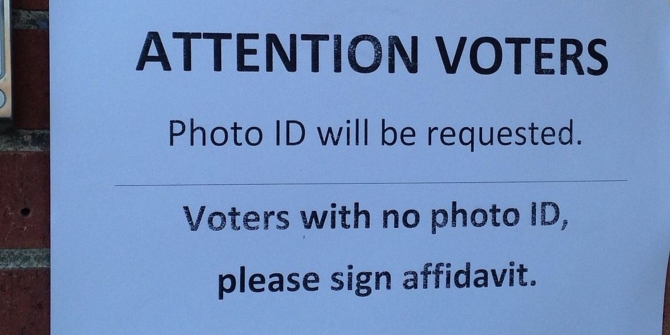 Earlier this month Democrat Andy Beshear beat incumbent Matt Bevin to win Kentucky’s gubernatorial race by about 5,000 votes. While Beshear’s victory in a generally Republican state may lead some to speculate that the GOP will face a difficult 2020 in Kentucky and even beyond, Anne Cizmar suggests caution. Matt Bevin’s loss, she writes, can mostly be attributed to his own unpopularity and poor governing strategies rather than a new wave against the Republican Party.
Earlier this month Democrat Andy Beshear beat incumbent Matt Bevin to win Kentucky’s gubernatorial race by about 5,000 votes. While Beshear’s victory in a generally Republican state may lead some to speculate that the GOP will face a difficult 2020 in Kentucky and even beyond, Anne Cizmar suggests caution. Matt Bevin’s loss, she writes, can mostly be attributed to his own unpopularity and poor governing strategies rather than a new wave against the Republican Party.
Kentucky, a state that voted for Donald Trump by more than 62 percent in 2016, just elected a Democratic governor. Governor-elect Andy Beshear beat the incumbent Republican, Matt Bevin, by around 5,000 votes (or 0.4 percent of the total)). This race has received international attention coming into the 2020 elections. President Trump actively campaigned for Matt Bevin, even traveling to Lexington, KY the night before the election to hold a campaign rally with Bevin. At that rally Trump said “If you lose, it sends a really bad message…you can’t let that happen to me”. Despite active campaigning by Trump, it wasn’t enough to boost Bevin to re-election. This has led to speculation that perhaps Republicans, including Kentucky’s senior Senator Mitch McConnell who is facing re-election in 2020, may be in for a tough contest. However, on closer inspection, signs point to the Bevin defeat as an anomaly.
The Beshear name is well known in Kentucky politics. Governor-elect Andy Beshear is the current Attorney General of the state. His father, Steve Beshear, also served as Kentucky’s governor from 2007-2015. Steve Beshear was relatively popular in the state and left office due to term limits. Andy Beshear also made a name for himself as Attorney General through several high-profile lawsuits. In one particularly significant victory, the pension bill sought by Governor Bevin was struck down because the legislation was enacted improperly. In short, the bill was brought as a surprise at the end of the legislative session when a controversial bill about pensions was substituted for a bill about wastewater treatment regulations without previous notice. The court ruled with Beshear on a matter that saw public protests from thousands of teachers around the state.
In addition to Beshear’s unique position as a challenger for governor, Matt Bevin was also a unique incumbent candidate. Despite being an incumbent, it was difficult to run on his record of past accomplishments for the state. He is very unpopular in the state. Approval ratings place him among the least popular governors in the US. In part, this is due to comments made about teachers and fellow Kentuckians. During the teacher pension strike this past January, Bevin said that kids were subject to sexual assault, physical harm, and drugs due to the strike. He then blamed teachers for a 7-year old being shot. When schools were closed in January 2019 due to cold weather, he said that “we’re getting soft”. His actions as governor made him an unpopular and divisive figure. Bevin sought to nationalize the election to capitalize on President Trump’s popularity in Kentucky—it was a better strategy than running on his “record” in the state. But what that means is making conclusions about other Republicans’ electoral fates based on Bevin is misleading. Bevin was a uniquely unpopular candidate. As the Trump campaign put it “The President just about dragged Gov. Matt Bevin across the finish line”.
Bevin’s actions as governor led to tensions with fellow Republicans in the state. He vetoed the pension bill passed by the legislature, which is under majority control of Republicans. He was slammed by the state Senate Leader who believed that Bevin gave mixed signals about the law. His rival Republican challenger in the primary, state Representative Robert Goforth, also commented that he was trying to force his policy preferences on the state legislature.

Credit: Famartin [CC BY-SA 4.0]
The governor’s race also featured a third-party candidate who potentially took votes from Matt Bevin. The Libertarian Candidate, John Hicks, received more than 28,000 votes. Bevin only lost by about 5,000 votes. Although we can’t be certain who Hicks’s voters would have supported in the election if there were no Libertarian candidate options, it’s possible that Hicks drew disproportionately from Bevin voters. In an unusual response to the election outcome, the Libertarian Party Facebook site said that the Bevin supporters’ “tears are delicious”.
It’s also important to note, when thinking about the implications for Republicans in 2020, that Bevin is the only Republican who lost his statewide bid on Election Day. The Attorney General, Agricultural Commissioner, Auditor, Secretary of State, Treasurer, and two special House elections all went for Republicans. The Attorney General’s race saw more than 57 percent of the vote go for Daniel Cameron, the Republican, over Greg Stumbo who was the former Speaker of the Kentucky House of Representatives.
Looking forward to 2020, Senate Majority Leader Mitch McConnell is facing re-election for the US Senate. McConnell is also well known for his unpopularity. However, McConnell has demonstrated his re-electability before. In his last re-election bid in 2014, he faced off against a quality contender in Alison Lundergan-Grimes in one of the most expensive Senate races in US history. He garnered 56 percent of the vote in a three-way race. McConnell may be running against Amy McGrath in November 2020—a former fighter pilot turned congressional candidate. Based on past electoral results, he’s likely to win.
The most important aspect of Kentucky’s gubernatorial contest for the 2020 elections may be the rhetoric swirling about Bevin’s loss and his unsubstantiated claims of voter fraud. After the election, he refused to initially concede the election with the claim that there were “a number of significant irregularities” in the votes. After the recanvass showed no substantial changes in the number of votes received, he finally conceded more than a week after Election Day passed.
The real impact of this election going forward may be the damage to trust in US political institutions and elections. This type of rhetoric can undermine faith in election outcomes and make the newly elected leader appear illegitimate. Additionally, it may cause a chilling effect on voter turnout due to overzealous voter fraud regulations. After the 2016 election that saw Trump win a majority of Electoral College votes, while losing the popular vote by almost 3 million votes, he made unsubstantiated claims of voter fraud. That was picked up by state leaders such as Kansas Secretary of State Kris Kobach. Hopefully this type of rhetoric doesn’t proceed into 2020.
Please read our comments policy before commenting.
Note: This article gives the views of the author, and not the position of USAPP – American Politics and Policy, nor the London School of Economics.
Shortened URL for this post: http://bit.ly/2XrFgEx
About the author
 Anne Cizmar – Eastern Kentucky University
Anne Cizmar – Eastern Kentucky University
Anne Cizmar is an Associate Professor in the Department of Government at Eastern Kentucky University. Her teaching and research interests include the presidency, American political behavior, and campaigns and elections. Her work appears in Political Research Quarterly and Public Administration Quarterly, among other outlets.







If Republicans really believe Hicks cost Bevin the election they should be forefront of the effort to replace our current first-past-the-post electoral system with one that uses Ranked Choice Voting. Under RCV if Bevins really was the second choice of those who voted for Hick, Bevins would have won.
Instead they choose to focus on restrictive ballot access requirements to keep all third parties from competing with them while refusing to simply accept that voters don’t like the candidates they are putting forward.